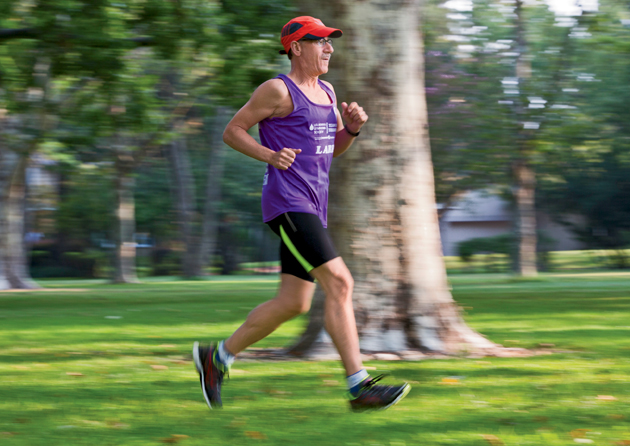
It’s late June in downtown Boston, and Boylston Street is bustling. As the sun peers through clouds on a humid, 80-degree Saturday afternoon, many people halt their sidewalk strolls to gaze at two locations.
It was at these spots nearly 11 weeks earlier that the city experienced a dark moment. On the afternoon of April 15, two bombs exploded near the finish line of the Boston Marathon, killing three people and injuring more than 250.
Thousands more were swept into the events of that Monday afternoon, Patriots’ Day. Among them were two Washington University alumni: Larry Saltzman, MD, AB ’74, a family care physician who ran in the marathon; and Leana Wen, MD ’07, an emergency medicine physician who treated patients rushed from the blast scenes.
More than two months later (when these interviews were conducted), their memories are still fresh and emotionally jarring. Their stories follow.
Motivated marathoner
Larry Saltzman earned his bachelor’s degree from Washington University with a major in biology in 1974. The Skokie, Ill., native completed his medical degree and residency, and then launched his medical career in Sacramento, Calif.
Saltzman, who turned 60 on Sept. 3, developed an interest in running at the age of 39. When he was 48, he challenged himself to run a marathon — a goal he wanted to achieve before turning 50, plus he wanted to get his weight and blood pressure under control.
Since 2001, he has run 15 marathons, including the 2012 Boston Marathon. That race was held in unusual conditions for April in New England, with temperatures reaching the mid-80s. Saltzman, like many of the runners, was not prepared for the heat. He finished the race, but posted the worst time of his marathoner career.
Driven by this poor time, Saltzman was determined to run Boston again. He was also motivated by another factor: In January 2010 Saltzman had learned he had leukemia and lymphoma. Doctors gave him only eight years to live.
Saltzman took the diagnosis in stride, literally. He continued working and running. And he volunteered for Team in Training, the organization that asks volunteers to solicit donations for the Leukemia & Lymphoma Society when they compete in endurance events.
Saltzman raised nearly $40,000 for the 2012 Boston Marathon. He garnered even more support for the 2013 race, raising $60,000 from more than 450 different donors. As a top fundraiser, he spoke at a Team in Training rally in Boston the Saturday before the race.
Following his speech, Saltzman retired to his hotel room. His race day routine dictated that he rise at 5:30 a.m., eat a banana and a PowerBar, and head to the start line in suburban Hopkinton, west of Boston. Upon arriving, Saltzman says, “I felt great.”

Calm under pressure
Leana Wen, 30, also awoke early on April 15 in Boston. As a fourth-year emergency medicine resident working that day at Massachusetts General Hospital, near the marathon’s finish line, she knew to expect a busy Monday. She prepared to treat maybe a dozen dehydrated, overheated runners.
Wen was born in Shanghai, China, and attended high school and college in Los Angeles. She enrolled in the Washington University School of Medicine and planned for a career conducting research in medicine and health policy. There, classmates and professors helped her realize that, with her calmness under pressure and ability both to work in teams and process information quickly, she was well-suited for emergency medicine.
Wen graduated from the School of Medicine in 2007 and completed a Rhodes Scholarship at the University of Oxford. She then moved to Boston. On April 15, she also rose at 5:30 in the morning and walked a half-hour from her Back Bay home to Massachusetts General in time for her 7 a.m. shift.
“It was a day like any other,” she recalls, “so I thought.”
In stride
The weather that morning was ideal for running: temperatures in the 50s, clear skies. To that day, it had been a glorious spring in New England. Saltzman started running about
10:40 a.m., one of thousands of runners heading east on the 26.2-mile course toward Boston.
Nearly three and a half hours later, at 2:08 p.m., the Boston Red Sox clinched a win at Fenway Park. Afterward, baseball fans filed out of the ballpark and headed down the Boylston sidewalks, toward the marathon finish line in front of the Boston Public Library. They cheered as marathoners ran by them in the street.
Saltzman soon approached. As he passed the 25-mile mark, he glanced at his oversized Garmin GPS wristwatch: “4 hours, 12 minutes,” it read. He was more than an hour ahead of his 2012 Boston pace. He would finish within 15 minutes, if all went according to plan. “It was a fantastic day,” Saltzman recalls. “I was feeling good, the vibes were good, the weather was good. I was running really well.”
Saltzman ran east down Beacon Street, passing Kenmore Square. He had just one mile to go.
ER inundated
About two miles northeast of the finish line, a colleague of Wen’s raced into the emergency room at Massachusetts General. It was 2:50 p.m.
A bomb has gone off, he announced. “I didn’t really comprehend what he was saying,” Wen recalls. “I didn’t think at the time to even ask where this happened.”
Wen then heard two more reports of a bombing. The third one established a vague location: the marathon. Dozens of injuries had occurred, Wen was hearing, maybe hundreds. Nobody in the ER knew for sure what had happened.
“Initially, all I was thinking about was what we needed to do to take care of these patients,” Wen recalls, “and the patients who were already in our ER.”
Some of those critically ill patients did not even have beds, because the ER was already full. Wen arranged to move them to other areas of the hospital, to clear space for the patients to come.
At 3 p.m., the doors to the ER flew open. Wen could see ambulances lined up outside. Injured bodies streamed in on stretchers. These folks had been near the library only minutes earlier. At 2:49 p.m., a bomb had gone off across Boylston from the library, in front of the Marathon Sports running store. Seconds later, another bomb detonated about 600 feet to the west.

Blood trailed the stretchers. Soot from the blasts was everywhere. Many patients wailed. One woman sobbed and wondered aloud where her husband and children were. She had suffered severe burns, and she was missing a foot. “They were scared,” Wen recalls. “They didn’t know what happened, where their families were. They thought they might die.
“We had to reassure them, even though we didn’t know what was going on, either.” Ambulance sirens wailed, and announcements of still more incoming patients echoed through the loudspeakers. The aroma of burning clothes and flesh filled the ER.
“It was a chaotic and confusing scene,” Wen recalls, “even though, in retrospect, I felt that we had things under control and everybody got the care they needed.”
Wen and her colleagues applied tourniquets to stop the bleeding and used CPR when necessary. They did not lose any patients.
“What was frightening was not just the extent of the injuries,” she recalls, “but also that we didn’t know how many more would be coming in.” (Thirty-one in all would arrive that day due to the blasts.)
The ER finally settled down about 6 that evening. Wen was not daunted by the injuries she saw. The volume of patients at once, however, surprised her.
In between treating patients, Wen tried to reach her husband, Sebastian Walker. When the injured started arriving, Wen soon realized where the bombings took place. Her husband was planning to go to the finish line to watch the marathon, he had told her. “That was really frightening,” she recalls, “because I had no idea whether he was there.” She could not get through to him, and she heard nothing from him, either. Her mind raced. “I didn’t know,” she recalls, “if I would see my husband as the next patient.”
Puzzling circumstances
About 3 p.m., Saltzman continued running east and approached Massachusetts Avenue. He noticed what seemed like a few hundred runners stopped in front of him. So he stopped, too, and glanced at his watch: “25.83 miles,” it read.
“I just ran into a wall of people, that was it,” he says. “Nobody knew what was going on.”
Saltzman wondered why he had to stop. He glanced at his cell phone and noticed a new text message. It was from his friends, a Sacramento couple who had gathered with his wife near the finish line. It read: “Stop running!
“All I heard were sirens. They were coming from everywhere.”
— Larry Saltzman
Saltzman was puzzled. Runners around him circulated a rumor: A gas line had burst near the finish line. Ambulances zoomed by. No race officials, or anyone else, arrived to offer an explanation. “All I heard were sirens,” Saltzman says. “They were coming from everywhere.”
Saltzman reached for his phone again and tried to dial his wife. No luck. He had no luck texting her, either. The network must be jammed, he figured.
Now he heard there had been an explosion near the finish line. He felt chills. “I thought it was my wife who got hit,” he recalls. “At that point nobody knew how bad it was.”
Another runner had cell phone service and handed Saltzman her phone. He dialed and heard ringing, but his wife did not answer her phone. “Why isn’t she picking up?” he wondered.
Next, he dialed his daughter, Jennifer, who lives in Brooklyn. She answered. “I’m OK,” Saltzman told her. He could hear her crying. His wife and friends were also OK, Jennifer relayed to him. He felt a lot better.
Saltzman also felt frustrated. After running more than 25 miles for more than four hours, he was not permitted to finish the race’s final half-mile. He stood around for about an hour. Dehydrated and soaked in sweat, he began cramping up and shivering. Nearby residents handed out water and large trash bags, for runners to cover themselves. He was grateful for that.
Trying to cope
Wen also felt anxious, as she continued to treat patients at Massachusetts General into the evening. A few hours after the blasts, she still had not connected with her husband. Finally, she saw a text from him. He was fine, he stated. He had misplaced his phone, then tried to come to the hospital to meet her. She relaxed, at least a little.
Exhausted, she left the hospital about 8 p.m. to meet her husband and walk home. Back Bay appeared deserted. Police officials had closed much of the neighborhood and urged people to stay off the streets. Wen’s gym, her grocery store, her local CVS — all were blocked off.
Then, she saw people jogging along the Charles River and eating at restaurants. “I couldn’t believe they were doing normal things,” Wen says, “after all I had witnessed and all Boston had gone through.”
About 11 p.m., she and her husband also did a normal thing. They walked to a sushi restaurant. “It was the most normal thing we could do,” she says, “and that was what we really needed at that time.”
They sat and ate. Wen did not discuss what she had seen in the ER that night, she says, “and I did not talk about it for quite some time after.”
She felt tremendous guilt for feeling upset, for feeling relief when she had realized her patients were not her husband, and then for feeling anything at all. “Who am I to feel any emotion about this,” she wondered, “other than gratitude that I was able to do something to help?”
Surreal aftermath
Saltzman reunited with his spouse that night, too, eventually. After city officials permitted the stalled runners to move, he walked to the nearby Park Plaza Hotel. He entered the spacious lobby and saw people resting on the floor all around him. Some were sobbing. “At this point I hadn’t seen any [news] footage,” Saltzman says. “I didn’t know how bad it was. I just knew people were injured.”
Saltzman headed for the room Team in Training had set up to greet runners when they finished. Organizers looked solemn. A couple of hours after the explosions, many runners had not yet entered the room. “The people managing the team had no idea where most of the runners were,” Saltzman says, “who was hurt and who was not.”
Saltzman saw one runner who did finish the race: a 20-something Caucasian woman, who had dyed her hair purple to honor Team in Training. She sat in a fetal position on the floor and rocked. People tried to console her, but she would not respond.
She had witnessed one of the bombs explode.
Saltzman left the hotel and made it through police barricades to his hotel near Copley Square. It was getting dark. He was hungry. He arrived and took the elevator to his room on the 17th floor. He knocked on the door.
His wife answered. They embraced, both crying. “I felt so fortunate,” he recalls, “to be standing there in one piece.”
Saltzman saw his friends in the room watching the news. He joined them, and then he saw for the first time broadcasts of the blasts.
It was horrible, surreal, he thought. He wondered why anyone would do this. “I hope they catch these guys,” he thought, “and string ’em up by their you-know-what.”
“Boston strong”
More than two months later, it’s summertime in Boston. Street vendors sell shirts proclaiming “Boston Strong” and “This is our F’ing city!” — mantras the city adopted after the bombings. A large, rectangular, royal-blue sign adorns the entrance of the library. It reads, in yellow and white letters: “BOSTON PUBLIC LIBRARY STRONG.”
Bostonians have moved on, but they are not over the bombings. Neither are Saltzman and Wen.
Wen suffered nightmares and sleepless nights for days afterward. It’s still hard for her to talk about what she saw.
“This is something that literally happened in our backyard, where all of us lived, where all of us worked, where all of us went to school.”
— Leana Wen
She eventually opened up, writing articles to help her cope, including for NPR and The Philadelphia Inquirer. “This is something that literally happened in our backyard,” she says, “where all of us lived, where all of us worked, where all of us went to school.”
Since that day in April, Wen has finished her residency. She and her husband have moved to Washington, D.C., where George Washington University’s Department of Emergency Medicine hired her as director of patient-centered care research.
The bombings have reinforced her appreciation for her medical training — and her faith in emergency medicine, family and community. “Boston can be a cold city. Medicine can be siloed and hierarchical,” she says. “But this was an event where everyone came together.”
Saltzman has likewise embraced family in the bombings’ aftermath. He feels a bit wary in large cities, and his politics are more conservative when it comes to national security.
His fortitude has not wavered. As of late July, however, his medical condition took a turn for the worse. He’s now undergoing six months of chemotherapy, which is scheduled to end in December. That said, Saltzman is still determined to run Boston next spring. Race officials have promised him a spot. He sees an opportunity to raise more money for the Leukemia & Lymphoma Society and to fulfill a gaping need. When he returned home from Boston in April, he thought: “I’ve got to finish the last half-mile,” he recalls. “I owe it to everybody who was affected to go back and do that.”
He is hopeful about his condition, but he does not know how much time he has left to run. So as he speaks into his cell phone on a late June evening, he defends his desire to run Boston 2014. His voice echoes the feelings of many in the city.
“I don’t want to live my life squandering opportunities because I’m nervous about what’s out there,” he says. “Next year, it’s a statement year. You can’t keep good people down. I’m focused on doing it.”
He and Wen are both Boston Strong.
Ryan Basen, AB ’00, is a freelance writer based in Silver Spring, Md.; he is the author of several sports biographies.
Comments and respectful dialogue are encouraged, but content will be moderated. Please, no personal attacks, obscenity or profanity, selling of commercial products, or endorsements of political candidates or positions. We reserve the right to remove any inappropriate comments. We also cannot address individual medical concerns or provide medical advice in this forum.